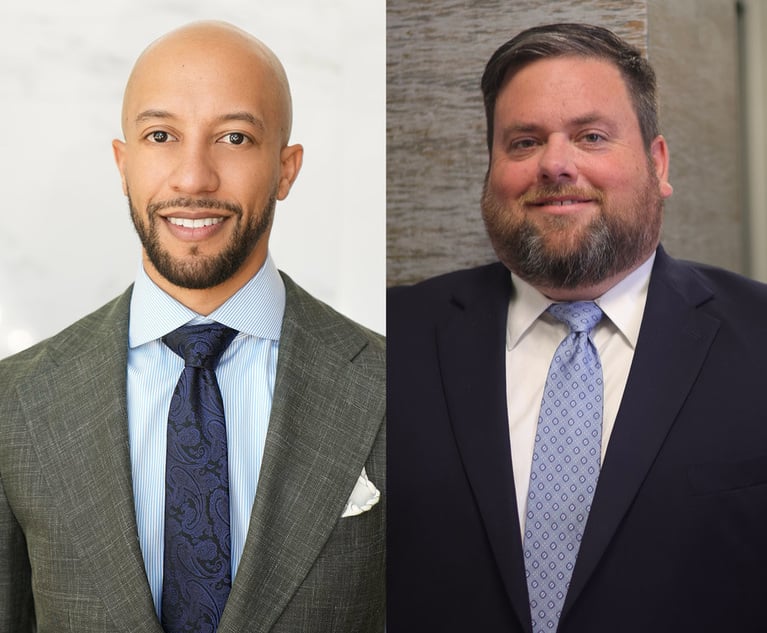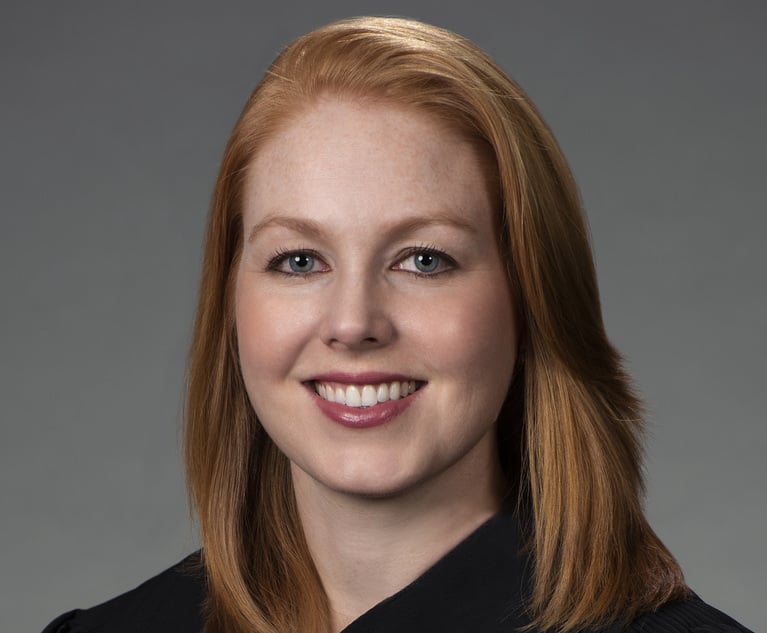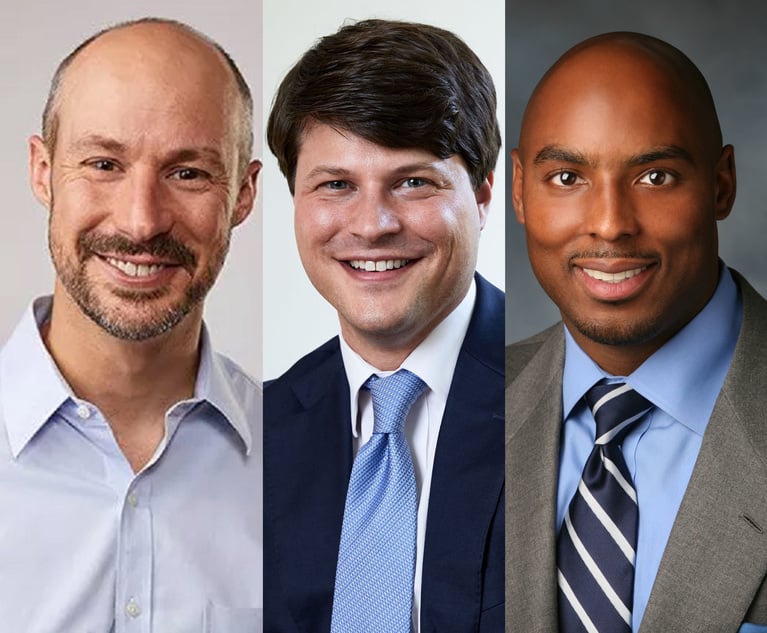Consider Other Options Than an Unjust Virtual Jury System
In response to the "unprecedented situation" that is the COVID-19 pandemic, Georgia Supreme Court Chief Justice Harold Melton effectively closed…
July 22, 2020 at 11:32 AM
6 minute read
 Winter Wheeler (left) and Joe Murphey of Miles Mediation. (Courtesy photos)
Winter Wheeler (left) and Joe Murphey of Miles Mediation. (Courtesy photos)
In response to the "unprecedented situation" that is the COVID-19 pandemic, Georgia Supreme Court Chief Justice Harold Melton effectively closed the state's court system on March 14. Unfortunately—and unavoidably—this judicial emergency has led to an immense backlog of cases waiting to be litigated and tried—a position in which most of the country now finds itself. In response, some states are considering the prospect of conducting virtual jury trials for civil cases, with the states of Texas and Florida having already taken concrete steps toward potentially implementing such a system. While we appreciate these states' willingness to experiment with possible solutions to the ever-growing caseload crisis, virtual jury trials are not a viable replacement for the traditional, in-person model. To understand why, it is important that we look not only look to what is occurring in the courts but also to what is happening in the streets and our communities.
Anti-racism protests have spread throughout the country, causing a huge majority of Americans to scrutinize how governments provide equality under the law to everyone. Much of that attention has been squarely and rightly focused on Georgia, bringing to light issues that those of us working within the legal community have long been aware. One such issue is the difficulty of ensuring juries represent a diverse and inclusive cross-section of the community—a standard of justice that the people of Georgia are calling for their state to meet. And the state and our courts should want to meet this challenge. Research shows that diverse teams tend to make better decisions, resulting in better outcomes for those involved. In other words, it is in the state's own interest to prioritize jury inclusivity and the more just resolutions that would result. Yet when thinking through what a virtual jury system would look like in Georgia, indicators point to a scenario where diversity and inclusion would be relegated to the side for the sake of expediency.
Setting up a virtual civil jury system that reflects the diversity of our communities intuitively sounds easy; especially for those of us who consider the internet as necessary as electricity and water. But in Georgia, the digital divide is very real. Many parts of the state lack the infrastructure necessary for high-speed broadband internet. In areas with broadband, many do not own the laptops, tablets or smartphones needed to securely connect online. For those that do happen to own these devices, many must opt-out of paying for reliable, consistently fast internet due to economic hardship—a fact that is now especially pronounced due to the high levels of unemployment caused by the pandemic. These factors can make the internet more of a luxury than it is an essential in-home utility. This reality exists throughout the state, disproportionately impacting communities of color and rural residents.
Any virtual jury trial programs would require jurors to affirm they are alone in a room for the duration of the trial proceedings. This means that only jurors who either live alone or have several rooms in their home where they can sequester themselves would be able to serve on a jury. Additionally, people who serve as sole caregivers of children, the elderly and/or disabled would be excluded, thus eliminating a large swath of the community from the jury pool. Those exclusions would disproportionately include women, people of color and lower-income Georgians, all of whom are more likely to serve as caregivers. In a virtual jury system, not only would the types of residents mentioned above be cut off from equally participating in the administration of justice but the system itself would be denied the more thoughtful decision-making that diversity engenders.
It is when these kinds of decisions are reached during deliberations that we see the real magic of having a jury comprised of one's peers. As jurors compare notes, make arguments, talk it out, weigh the pros and cons and take votes they become a sum greater than their parts. That magic—which can only happen after an engagingly participatory deliberations process—will not be demonstrated by a jury that is structurally set up in an exclusionary way. For every voice to be heard, it helps if jurors feel that they and their experiences are not tokenized but instead truly welcomed—meaning that ensuring diversity might be the best tool we have to produce the more credible decisions Georgians need to see in order to have confidence in our justice system.
In a virtual jury system, it would be extremely important for the proceedings to be conducted using high-speed internet services and high-quality hardware. Streaming video and sound can be adversely affected by a weak signal, an old modem and even a participant's outdated camera or microphone. Insufficient technological performance would invariably lead to individual jurors having uneven perceptions of any presented evidence. Additionally, the potential for jurors to miss crucial testimony is high. If this should occur, but for a juror speaking up, the judge and attorneys would be unaware. This leaves the court having to rely on jurors overcoming any hesitation to interrupt and pause the proceedings—a responsibility that jurors will undoubtedly find discomforting. A virtual format will feature time lags, cut off voices and lesser Wi-Fi connections yielding to stronger ones; leading to a deliberations process that would be distorted at best and dysfunctional at worst. In these likely scenarios, there is a real possibility that attorneys will face increased malpractice claims associated with technological deficiencies as well as novel appellate issues (ironically adding to the logjam of civil cases).
Overcoming all these logistical and procedural hazards creates an inherent burden for either the government (state and local) or individual citizens. After all, someone will have to pay for the high-quality technology needed. If not, every jury pool will be restricted to only those who can afford to participate. The only acceptable way forward would be for the courts to provide the necessary hardware, internet, security and in-home IT support—an expensive endeavor that is not feasible given that the pandemic has also created financial hardship for state and local budgets.
The logjam of civil cases continues to deepen, and many attorneys and clients alike are understandably anxious to move their cases to conclusion. But it would be counterproductive and counterintuitive for Georgia to invest time and money into building an ad hoc system that we know in advance will be unjust. Fortunately, we can avoid haphazard virtual civil juries by exploring existing trial alternatives that would allow our state to meet the needs of the moment and build a more inclusive justice system for all Georgians.
Winter Wheeler and Joe Murphey have both worked as civil litigators and currently serve as arbitrators and mediators in Atlanta at Miles Mediation & Arbitration.
This content has been archived. It is available through our partners, LexisNexis® and Bloomberg Law.
To view this content, please continue to their sites.
Not a Lexis Subscriber?
Subscribe Now
Not a Bloomberg Law Subscriber?
Subscribe Now
NOT FOR REPRINT
© 2025 ALM Global, LLC, All Rights Reserved. Request academic re-use from www.copyright.com. All other uses, submit a request to [email protected]. For more information visit Asset & Logo Licensing.
You Might Like
View All
Trial Court Had No Authority to Reopen Voir Dire After Jury Impaneled in Civil Case, State Appellate Court Rules

'Pushed Into Oncoming Traffic': $5.85M Settlement in Mediated Auto Tort
6 minute read
Justice Known for Asking 'Tough Questions' Resolves to Improve Civility
4 minute read
Trending Stories
- 1Relaxing Penalties on Discovery Noncompliance Allows Criminal Cases to Get Decided on Merit
- 2Reviewing Judge Merchan's Unconditional Discharge
- 3With New Civil Jury Selection Rule, Litigants Should Carefully Weigh Waiver Risks
- 4Young Lawyers Become Old(er) Lawyers
- 5Caught In the In Between: A Legal Roadmap for the Sandwich Generation
Who Got The Work
J. Brugh Lower of Gibbons has entered an appearance for industrial equipment supplier Devco Corporation in a pending trademark infringement lawsuit. The suit, accusing the defendant of selling knock-off Graco products, was filed Dec. 18 in New Jersey District Court by Rivkin Radler on behalf of Graco Inc. and Graco Minnesota. The case, assigned to U.S. District Judge Zahid N. Quraishi, is 3:24-cv-11294, Graco Inc. et al v. Devco Corporation.
Who Got The Work
Rebecca Maller-Stein and Kent A. Yalowitz of Arnold & Porter Kaye Scholer have entered their appearances for Hanaco Venture Capital and its executives, Lior Prosor and David Frankel, in a pending securities lawsuit. The action, filed on Dec. 24 in New York Southern District Court by Zell, Aron & Co. on behalf of Goldeneye Advisors, accuses the defendants of negligently and fraudulently managing the plaintiff's $1 million investment. The case, assigned to U.S. District Judge Vernon S. Broderick, is 1:24-cv-09918, Goldeneye Advisors, LLC v. Hanaco Venture Capital, Ltd. et al.
Who Got The Work
Attorneys from A&O Shearman has stepped in as defense counsel for Toronto-Dominion Bank and other defendants in a pending securities class action. The suit, filed Dec. 11 in New York Southern District Court by Bleichmar Fonti & Auld, accuses the defendants of concealing the bank's 'pervasive' deficiencies in regards to its compliance with the Bank Secrecy Act and the quality of its anti-money laundering controls. The case, assigned to U.S. District Judge Arun Subramanian, is 1:24-cv-09445, Gonzalez v. The Toronto-Dominion Bank et al.
Who Got The Work
Crown Castle International, a Pennsylvania company providing shared communications infrastructure, has turned to Luke D. Wolf of Gordon Rees Scully Mansukhani to fend off a pending breach-of-contract lawsuit. The court action, filed Nov. 25 in Michigan Eastern District Court by Hooper Hathaway PC on behalf of The Town Residences LLC, accuses Crown Castle of failing to transfer approximately $30,000 in utility payments from T-Mobile in breach of a roof-top lease and assignment agreement. The case, assigned to U.S. District Judge Susan K. Declercq, is 2:24-cv-13131, The Town Residences LLC v. T-Mobile US, Inc. et al.
Who Got The Work
Wilfred P. Coronato and Daniel M. Schwartz of McCarter & English have stepped in as defense counsel to Electrolux Home Products Inc. in a pending product liability lawsuit. The court action, filed Nov. 26 in New York Eastern District Court by Poulos Lopiccolo PC and Nagel Rice LLP on behalf of David Stern, alleges that the defendant's refrigerators’ drawers and shelving repeatedly break and fall apart within months after purchase. The case, assigned to U.S. District Judge Joan M. Azrack, is 2:24-cv-08204, Stern v. Electrolux Home Products, Inc.
Featured Firms
Law Offices of Gary Martin Hays & Associates, P.C.
(470) 294-1674
Law Offices of Mark E. Salomone
(857) 444-6468
Smith & Hassler
(713) 739-1250






